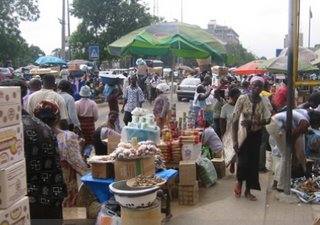Accra's Makola Market - another example of self-organzation
While there are supermarkets in Western style in Accra where the tourist or expat from the Northern hemisphere can buy almost everything, this is not where Ghanese people shop for their food and other daily necessities. Rather, they go to the Makola market, which I found yet another amazing example of self-organization and swarm creativity.

The Makola market is not only at the heart of Accra, it literally is THE heart of Accra. Located in the middle of the town, it is the place for 90% of Accra’s inhabitants to buy all their goods for daily life. Other than submarines and aircraft carriers, there is very little that can not be bought at Makola market. There is no central control, each booth is operated by its owner. At the top of the range are the established stores, where a room facing the street has been converted into a market stand. At the other range of the spectrum, little vendors display their wares on a blanket on the sidewalk. Heaps of shoes, staples of fresh and dried fish, life chickens, rows and rows of vegetables, fruit, and other types of food, staples of school books, all sorts of cloths and fabrics, suitcases, and myriads other things form a chaotic composition of colors, smells, and textures, that overwhelms the tourist.
For the expert visitor of the Makola market, though, it is actually quite easy to navigate the market. Each of the different types of goods and groceries occupies a distinct spot within the sprawling expanse. Vendors of vegetables, fruits, meat, or fish, but also of suitcases, clothes, shoes, or school books have their pre-allocated locations. Why is it, for example, that there is an entire road where there is one booth besides the other only selling suitcases?

The Makola market is not only at the heart of Accra, it literally is THE heart of Accra. Located in the middle of the town, it is the place for 90% of Accra’s inhabitants to buy all their goods for daily life. Other than submarines and aircraft carriers, there is very little that can not be bought at Makola market. There is no central control, each booth is operated by its owner. At the top of the range are the established stores, where a room facing the street has been converted into a market stand. At the other range of the spectrum, little vendors display their wares on a blanket on the sidewalk. Heaps of shoes, staples of fresh and dried fish, life chickens, rows and rows of vegetables, fruit, and other types of food, staples of school books, all sorts of cloths and fabrics, suitcases, and myriads other things form a chaotic composition of colors, smells, and textures, that overwhelms the tourist.
For the expert visitor of the Makola market, though, it is actually quite easy to navigate the market. Each of the different types of goods and groceries occupies a distinct spot within the sprawling expanse. Vendors of vegetables, fruits, meat, or fish, but also of suitcases, clothes, shoes, or school books have their pre-allocated locations. Why is it, for example, that there is an entire road where there is one booth besides the other only selling suitcases?



Comments
Post a Comment